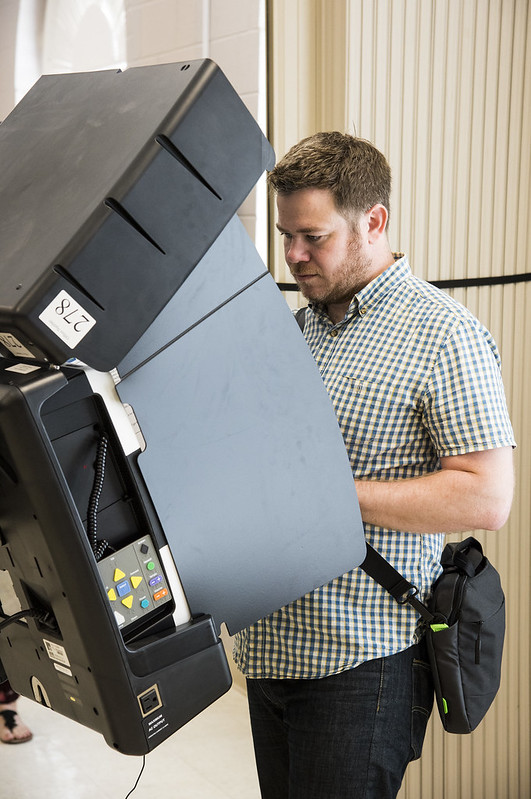March
Contact
Kristin Higgins
Public Policy Center
Phone: 501-671-2160
Email: khiggins@uada.edu
University of Arkansas System Division of Agriculture
Cooperative Extension Service
2301 S. University Avenue
Little Rock, AR 72204
Arkansas Legislators Tighten Special Election Dates
 Two years after they standardized special election dates, Arkansas legislators passed
another state law to further tighten when cities and counties can hold special elections.
Lawmakers said aligning special elections with primaries and general elections will
keep tax burdens low for voters by making it harder for local government to "sneak
things past them."
Two years after they standardized special election dates, Arkansas legislators passed
another state law to further tighten when cities and counties can hold special elections.
Lawmakers said aligning special elections with primaries and general elections will
keep tax burdens low for voters by making it harder for local government to "sneak
things past them."
"Local governments in Arkansas have used special elections held at irregular times consistently to raise taxes on our citizens. And in many instances this is a deliberate strategy aimed at keeping turnout low so that the folks who do show up are those with a vested interest in the passage of that measure," said Rep. David Ray, sponsor of House Bill 1510.
The bill has since been signed into law and is now Act 300. It will apply to any local special election, which typically involve property taxes, sales taxes, legalizing alcohol sales, and bond issues.
In 2021, Sen. Jason Rapert led changes to state law that created standard dates for local special elections. Prior to Act 610 of 2021, cities and counties could hold a special election on any Tuesday of a month determined by city councils and quorum courts. In recent years, many communities have used special elections to fund building or renovating county jails.
Research from the University of Central Arkansas reflects that between 1981 and 2020, 82% of local sales tax elections took place during special elections. Another 14% took place during fall general elections.
"Our combined state and local sales tax in Arkansas is currently 9.47%, which is the third highest in the entire country. We are never going to get that issue under control unless we fix our special election problem," Ray said at a March 1 House State Agencies and Governmental Affairs Committee meeting.
Ray and others criticized a library and a school district for holding a special election to raise property taxes on Valentine's Day earlier this year. However, Feb. 14 was a date that fell within the four dates established by the 2021 state law.
"The turnout was 3.8 percent," Ray said about the North Little Rock library tax election. The proposal, plus the high school millage in the Highland School District, failed at the polls Feb. 14.
Rep. Nicole Clowney pushed back on assertions that special election dates benefit only the "yes" side of a local ballot issue.
"My concern is, I’m picking up this thread of not trusting Arkansas voters. Somehow holding these elections on one of four days that's set out in statute rather than two days gives us a lot of opportunity to sneak things by the voters," she said during the March 1 committee meeting, where she voted against the bill.
She said usually people are "very motivated for or against" an issue on a local ballot.
Ray said he thought the new dates would increase voter turnout.
"Voters aren't used to going to the polls in February or in August, " Ray said. "For most folks, who are just trying to live their lives, work a job or take their kids to to ball practice or gymnastics. People aren't combing the news to find out if there is going to be a local option sales tax election in the middle of August when they have their summer vacation planned."
New Special Election Dates
Currently, state law sets four days for a special election. In a presidential-election year, special elections on local ballot issues must take place the second Tuesday of March, May, August or November. In non-presidential election years, special elections are set for the second Tuesday in February, May, August or November.
Starting Jan. 1, 2024, state law will allow only two dates a year.
- In a presidential-election year, special elections would be allowed the second Tuesday
in March or November.
- In non-presidential election years, cities and counties could hold special elections on the second Tuesday of May or November.
What Is Considered An Emergency?
Act 300 allows cities and counties to hold an election on a different date in case of emergency. The law defines an emergency to mean that:
- A substantial change has occurred in the interpretation of the law by a federal or state courts which if not addressed by an election will render the governing entity incapable of performing its lawful duties and obligations;
- Circumstances due to a fire, flood, tornado, or other natural disaster which if not addressed by an election will render the governing entity financially incapable of performing its lawful duties and obligations;
- Circumstances that the governing body of the entity requesting the election has determined to be an imminent danger to public health and safety;
- A delay of the emergency special election until the next date under this section would cause a substantial and undue hardship to the governing entity or a threat to the public peace, health, and safety.
Local Ballot Issue Education
The Public Policy Center has worked with cities and counties over the past decade on providing voters with fact sheets about special elections. We encourage communities to contact their county extension agent as soon as there is discussion about an election so the fact sheet can be completed before early voting starts and in time for any public meetings on the issue.
Interested in our services? Review our criteria and past materials